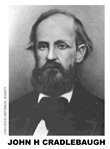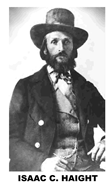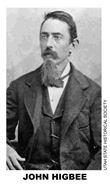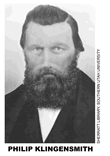

Towards the end of September, 2 weeks after the
massacre, Garland Hurt, the federal Indian Agent hears rumors he is
about to be assassinated because he knows too much about the massacre.
Assisted by Utes he had befriended, he flees the area. In March 1858, Congress orders an official inquiry
be made into the massacre. In November 1858, U. S. District Judge John Cradlebaugh
arrives in Utah and vows to prosecute those responsible for the massacre.
Judge Cradlebaugh later issues arrest warrants for John D. Lee, Isaac
Haight, and John Higbee. The three men disappear. Indian Superintendent Jacob Forney travels through
southern Utah, rounding up children orphaned by the massacre. He eventually
retrieves 17 children. May 1859, An arrest warrant is issued for Brigham
Young. He appears voluntarily in Probate Court before Judge Joseph
Smith to give a statement about the massacre, in which he accused
of being an accessory after the fact. The case is apparently dismissed
for lack of evidence. Not surprising considering Brigham Young had
complete control over the court system. For instance; only Mormons
could serve jury duty. In June, Federal charges are filed against 38 others
who participated in the massacre. The warrants are never enforced
because the US Marshal refuses to serve them without protection of
federal troops. That protection never materializes. In December, Indian Superintendent Jacob Forney
goes to Washington, accompanied by the two oldest massacre survivors.
He hopes the boys will be allowed to testify before Congress. As the Civil War looms, interest in the massacre
begins to fade. Governor Cumming states that prosecution is all but
impossible "God Almighty couldn't convict the butchers unless
Brigham Young was willing." Judge Cradlebaugh claims that while at Cedar City
he "was visited by a number of apostate Mormons," who gave
him "every assurance that they would furnish an abundance of
evidence in regard to the matter, as soon as they were assured of
military protection." "While there;" he also says,
"I issued warrants on affidavits filed before me for the arrest
of the following named persons; Jacob [Isaac C.] Haight, president
of the Cedar City stake; Bishop John M. Higbee, and Bishop John D.
Lee [Lee never was, at any time or place, a "Mormon" bishop,
though he was an "elder," and had presided over a small
settlement or branch of the church], Columbus Freeman, William Slade,
John Willis, William Riggs,—— Ingram, Daniel McFarlan,
William Stewart, Ira Allen and son, Thomas Cartwright, E. Welean,
William Halley, Jabez Nomlen, John Mangum, James Price, John W. Adair,——
Tyler, Joseph Smith, Samuel Pollock, John McFarlan, Nephi Johnson,——
Thornton, Joel White,—— Harrison, Charles Hopkins, Joseph
Flang, Samuel Lewis, Sims Matheny, James Mangum, Harrison Pierce,
Samuel Adair, F. C. McDulange, William Bateman, Ezra Curtis, and Alexander
Loveridge. (Congressional Globe, 37th Congress, 3rd Session, Appendix,
p. 123).
1871 – Philip Klingensmith testifies in a Nevada court as to
his involvement in the massacre.
For an event that was supposed to be “shrouded in secrecy”
word certainly traveled fast. Within weeks in seemed as if everyone
in Utah knew about. Many were outraged but reticent to speak out for
fear of retribution. This was the during the time of Young’s
“Reformation” and rumors still abounded of people being
swept away in the middle of the night by “Danites” never
to be seen again. Danites or not, speaking out against the Elders
was dealt with swiftly and harshly. By the end of the year, newspapers
from one coast to the other were carrying stories of “Brutal
murders by savage Mormons”
Only 2 weeks after the massacre, Garland Hunt, the Federal Indian
Agent in Salt Lake City hears that he is about to assassinated for
asking too many questions about the rumors he has been hearing. Assisted
by Utes he had befriended, he flees the area.
By early spring, word had reached the Houses of Congress, who ordered
an official inquiry be made by the War Department. Orders were sent
to the Army in Fort Bridger, who were preparing to invade Utah, to
affect an investigation.

The Defendants

 \
\

utahan.org is a private organization funded by member donations contact: info@utahan.org